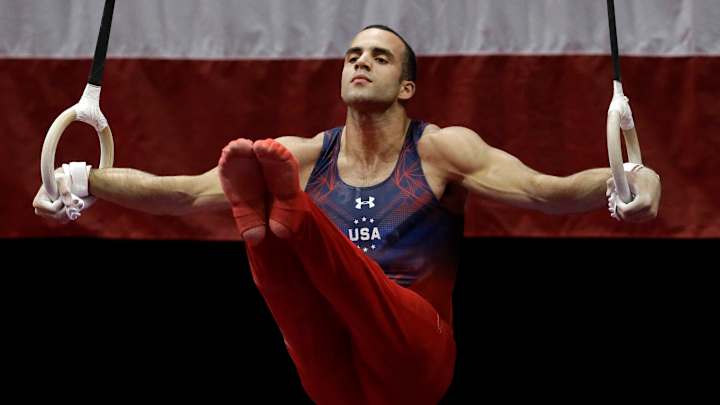Leyva, Whittenburg and Modi trying to embrace alternate role

ST. LOUIS (AP) Donnell Whittenburg lay in his hotel room late Saturday night, his body exhausted but his mind unable to turn itself off after a once seemingly assured spot on the U.S. Olympic men's gymnastics team slipped away, when his phone rang.
Congratulations, said national team coordinator Kevin Mazeika. There's a spot available as an alternate if you want it.
Whittenburg politely accepted the invite then went right back to trying to explain to his mother how a two-time world championship team member and one of America's rising stars found himself on the outside looking in when the official five-man Olympic squad was announced at the end of an electric final round at Olympic Trials.
''She was still kind of shocked,'' Whittenburg said. ''She's not really that familiar with the whole process and how it works. She was still kind of confused. But after a while she just told me to own it and take on a new role.''
One that in many ways will be more emotionally and physically challenging than the one faced by Sam Mikulak, Jake Dalton, Alex Naddour, Chris Brooks and John Orozco, all of whom celebrated with tears amid an ocean of balloons after hearing their names called during a brief meeting just after the conclusion of the Olympic Trials.
While trying to get the U.S. back on the podium four years after washing out in the team finals in London four years ago will be difficult, at least it's a tangible destination.
That's not necessarily the case for Whittenburg and fellow alternates Danell Leyva and Akash Modi, who have to find a way to stay mentally prepped for an opportunity that may never come. It's a position Brooks knows only too well. The 29-year-old was a replacement athlete in London, making the trip across the Atlantic then spending the meet as a one-man megaphone in the stands while his friends slogged to a fifth-place finish. Trying to reconcile the mixed emotions that come ''when you're literally 20 feet from your dream'' as Brooks put it, is not easy.
''You get the messages, `Oh congratulations,''' he said. ''You're trying to be nice but in the back of your head you're like, `I didn't really make it.' You have those thoughts. It's part of being a human being.''
Yet disappointment is one thing. Duty is another, something Leyva was reminded of while talking to 2008 Olympian Raj Bhavsar on Saturday. Bhavsar was an alternate in 2004 and again four years later when he found himself thrust into the lineup after a broken hand forced defending Olympic champion Paul Hamm to abandon hopes of a repeat.
''He said, `you never know what's going to happen, so be ready,''' Leyva said.
Leyva should know. He became just the third American man in a century to win an individual all-around medal when he surged to bronze in London, the only hardware the U.S. men's program checked in customs on their way back home. Shortly after the awards ceremony, Leyva said emphatically his goal over the ensuing quadrennium was to make inroads on Olympic champion Kohei Uchimura of Japan.
Now, he'll only get the chance if one of his teammates goes down. The 24-year-old struggled during the opening two rounds of qualifying in Hartford earlier this month. Though he was markedly improved at trials - his performance on vault Saturday night drew the customary frantic fit of joy by stepfather/coach Yin Alvarez - it wasn't enough to sway the selection committee. On the surface it appears as if Leyva took a step back, a notion that obscures the tangible proof that the guys who made the team ahead of Leyva took a step forward, a clear sign the program is heading in the right direction.
''I feel like it kind of speaks for itself about the depth that U.S. gymnastics has,'' Leyva said.
USA Gymnastics decided to hold men's trials two weeks before the women's to give the team members a brief -very brief - breather before beginning final preparations for Rio. It also provides the alternates a little extra time to get over any lingering frustration.
Officials, well aware of the delicate circumstances, have put together a plan designed to create a near identical experience for all involved up until opening ceremonies on Aug. 5. The Olympic team and the replacement athletes will work out side-by-side over the next six weeks in what can best be described as a high-profile intrasquad meet, one Whittenburg plans to take as seriously as the real thing.
''I want to make sure I'm pushing those guys (on the team) as best I can,'' Whittenburg said.
If they need advice on how to handle it, they need only ask Brooks. Four years ago, he and Naddour trained away from the team once the games began then sat in the O2 Arena while their friends competed on the floor below. It wasn't the best time ever. Yet it's what the program needed.
''You have to basically man up and put all that stuff aside and get ready,'' Brooks said. ''Gymnastics is a cruel, cruel sport. At the drop of the hat, a lineup can change.''
